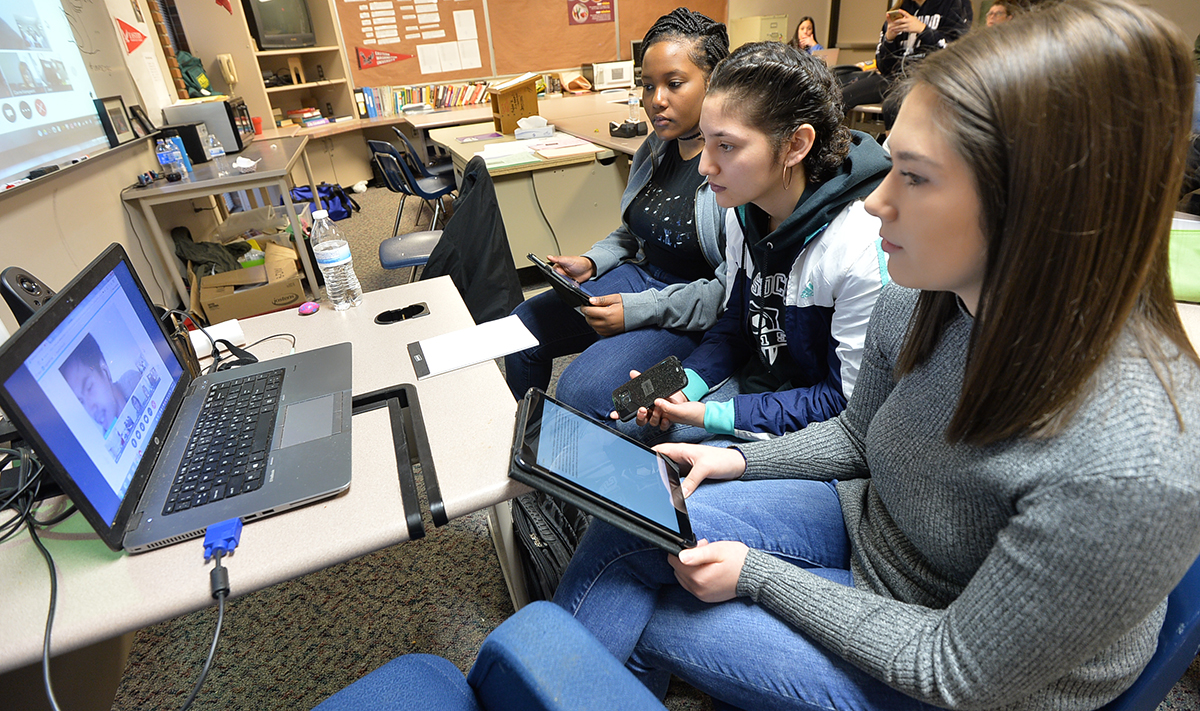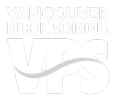
Pictured: front, Rebecca Batman; center, Karinna Aguas; back, Sharon Njoroge
At 6:30 a.m., one hour before the school day would officially start, a small group of students gathered at Fort Vancouver High School to discuss how their actions affect others. The context—and the timing—of the discussion was unique. The Fort Vancouver students were part of a global town hall that brought together students from 11 other countries in real time.
The town hall, held via teleconference on Feb. 28, was the culmination of an independent study course sponsored by UNESCO and led by two educators in Canada, the host country for the study course. Students representing 12 countries collaborated to discuss topics covering quality education and global citizenship. As a schoolwide magnet site for the Center for International Studies, Fort Vancouver High School was uniquely qualified to participate in the global forum. Fort also was the only United States school chosen to participate.
Fort juniors Rebecca Batman, Karinna Aguas and Sharon Njoroge were paired with a team of students from Brazil. They compared educational opportunities in their respective countries, and discussed how education impacts global citizenship.
Said Batman about working with the students from Brazil, “We got a broader perspective of issues that each of our countries face, and how we can contribute to them, how we can contribute to the world, and overall being a global citizen.”
Working with the other students and learning about opportunities and disadvantages in each country was eye-opening. The conversations created awareness among the participating students, as well as a sense of empowerment.
“The best part of this project was having to face up to not only being aware about situations going on within your community, but also situations going on across the world, and realizing that most of the time you are not alone in some of these situations,” said Aguas. “As a young adult, I know in a lot of situations you feel alone, but knowing and being aware that other people in other countries are facing similar situations brings you more comfort and tells you that there is a better hope for the future.”
All students participated in classroom activities and online discussions. They researched and collected survey data. They wrote essays and blogs based on their discussions and research. Their collective work was then compiled and presented as a white paper at the UNESCO conference in Ottawa, Canada, in March. The white paper, Global Citizenship through Education, focused on the right to and availability of education, and how education can inform global citizenship.
Njoroge, a native Kenyan, moved to Vancouver with her family last August and now serves as an ambassador for Fort’s Center for International Studies.
“The group that we had, we all evoked thought,” said Njoroge. “Now the issues that affect us are out there. And the issues that affect them, we know. It is so powerful to know that there are kids out there who actually think of ways to change the world and make a difference.”
During the town hall, young people from the represented countries took turns articulating their perspectives. One by one, the groups appeared on the screen: Slovenia, Haiti, Palestine, Kenya, New Zealand, Brazil, Philippines, Sweden, Germany, Morocco. Finally, it was the United States’ turn. As their classmates around the world listened, Aguas, Batman and Njoroge confidently shared their findings about the importance of education in a global world.
When they finished and their microphone was off, Aguas turned and high-fived her teammates.
“Oh my gosh, we nailed it!” she shouted, celebrating their finale on the world stage.
How did the girls feel about being chosen as the only school to represent the United States?
“It’s cool to be the voice for our country. And to get our thoughts and feelings out to the world, and our perspectives as well,” said Batman.
“I feel like Fort has so much to offer the world and it is so amazing that we had this group of kids sit down and write their ideas and debate and challenge each other,” said Njoroge. “It’s so empowering to see that even though we are young, we have a voice. Our ideas get out there and we have a chance to change the world and make a difference.”
